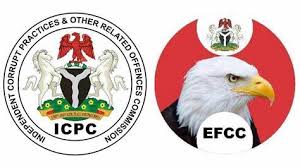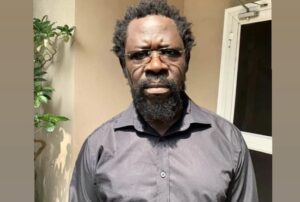

Court orders EFCC, ICPC to prosecute 2023 election offenders, holds Govs accountable for violence
The Federal High Court sitting in Abuja, in a groundbreaking judgement, has ordered the Independent National Electoral Commission (INEC) to hold Nigeria’s state governors, their deputies and others to account over cases of electoral violence, bribery, vote-buying, and conspiracy during the chaotic 2023 general elections.
In a first, the court ordered INEC to ensure “the appointment of independent counsel to investigate cases of electoral violence and other electoral offences against state governors and their deputies during the 2023 general elections.”
The court also ordered INEC to “to promptly, thoroughly and effectively investigate cases of electoral violence and other electoral offences committed during the 2023 general elections and to identify suspected perpetrators and their sponsors and ensure their effective prosecution.”
The judgement was delivered last Thursday by Hon. Justice Obiora Atuegwu Egwuatu following a mandamus lawsuit number: FHC/ABJ/CS/583/2023, brought by the Socio-Economic Rights and Accountability Project (SERAP).
Justice Egwuatu also ordered INEC “to swiftly prosecute all arrested offenders in the 2023 general elections in the custody of the Nigeria Police Force, Economic and Financial Crimes Commission (EFCC) Independent Corrupt Practices and Other Related Offences Commission and other law enforcement agencies.”
In his judgement, Justice Egwuatu held that, “I have compassionately evaluated the depositions in the affidavit of SERAP and I have no reason not to believe the depositions more so when there is documentary evidence in support of the depositions.”
Justice Egwuatu also stated that, “In the circumstances therefore, I find merit in the application. The sole issue of whether this Court ought to grant the relief of judicial review and orders of mandamus is resolved in favour of SERAP. Accordingly, I grant the prayers sought.”
Justice Egwuatu’s judgement, dated 18 July, 2024, read in part: “Being citizens of this great country, SERAP and its members have the legal interest whose enjoyment or enforcement directly or substantially depends on the performance of public duty by INEC.”
“In requesting the performance of the public duty imposed on the electoral body, SERAP has demonstrated a great zeal of patriotism.
“The substance of SERAP’s grouse is the violence associated with elections in Nigeria which tends to prevent citizens from exercising their franchise during elections, thus preventing credible election and in the long run credible leaders.
“There is no gainsaying the fact that electoral violence and the associated crimes committed during elections in Nigeria is a great bane to the development of this country both democratically and economically.
“SERAP has also shown vide exhibit A8, a letter addressed to INEC requesting amongst other things the appointment of independent counsel to investigate allegations of electoral offences, including bribery, conspiracy, and undue influence against state governors and their deputies during the 2023 general elections.
“Exhibit A8 is thus a distinct and clear demand for the performance of the duty made by SERAP. The electoral body till the date of filing the action failed to, refused and or neglected to carry out or perform the duty requested by SERAP.
“There is no doubt that the Electoral Act 2022 creates some electoral offences. Sections 123, 124, 125, 126 127, 128 and 129 are some of the provisions of the Electoral Act that created some specific electoral offences.
“Trial of offences created by the Electoral Act are done in a Magistrate Court or a High Court of a State in which the offence is committed, or the Federal Capital Territory, Abuja. See Section 145(1) of the Electoral Act.
“By section 145(2) of the same Act, prosecution for the offences shall be undertaken by legal officers of INEC or any legal practitioner appointed by INEC. Clearly therefore, the law imposes on INEC the performance of a public duty.
“Section 24(d) and (e) of the Nigerian Constitution 1999 [as amended] recognizes the rights of citizens to take steps towards advancing the community where he resides.
“The section provides that ‘it shall be the duty of every citizen to-(d) make positive and useful contribution to the advancement of progress and well-being of the community where he resides; (e) render assistance to appropriate and lawful agencies in the maintenance of law and order.
“By the provision of order 34 of the Federal High Court (Civil Procedure) Rules, 2019, this court is empowered to grant an order of mandamus, prohibition or certiorari in the manner set out in the order.
“On an application for judicial review, any relief mentioned in rule 1 of order 34 may be claimed as an alternative or in addition to any other relief so mentioned if it arises out of, relates to or is connected with the same matter.
“An order mandamus lies to compel the performance of a public duty at the instance of a person who has sufficient legal interest in the performance of that public duty.
“Where a public duty is imposed on a public or government body, authority, department or official and the authority, department or official refuses or fails to perform that duty, an order of mandamus would issue to compel that body, authority, department or official to carry out that duty in respect of a person whose interest is directly and substantially affected by the refusal or failure to perform that duty.
“I must say that the entirety of the facts deposed to by SERAP were not controverted by INEC. It is trite that depositions in affidavit on material facts resolve applications in court. Where depositions on material facts in an affidavit in support of an application are not denied by the adverse party filing a counter-affidavit, such facts not denied in the affidavit in support remain the correct position and the court acts on them except they are moonshine.
“While it is generally well settled that unopposed averments in an affidavit will be deemed admitted, it is also trite that the court has a duty to evaluate the unopposed averments and determine whether, as they stand, they justify the grant of the reliefs sought.
“The mere fact that the averments are not denied does not mean that the court must accept them without more. The averments, even if accepted by the court, must be cogent and credible. If the court is not so satisfied, the application will be refused.
SERAP deputy director Kolawole Oluwadare said: “This ground-breaking judgment is an important milestone for Nigerians’ right to free and fair elections, and for victims of electoral offences in their search for justice, truth and reparations for the crimes which took place during the 2023 general elections.”
“Justice Egwuatu’s judgement now provides a binding precedent for INEC to immediately pursue justice for those who suffered egregious abuses in Nigeria’s 2023 general elections. We commend Justice Egwuatu for his wisdom and courage, and his landmark decision.
“Respecting and implementing Justice Egwuatu’s judgment is imperative for protecting the rights of Nigerians to a free and fair election and reinforcing the primacy of the Nigerian Constitution, Electoral Act and the country’s international obligations.
“We urge INEC to immediately obey the court orders. The effective enforcement of Justice Egwuatu’s judgement will break with decades of impunity for electoral offences in Nigeria.
In the letter dated 20 July 2024 sent to Professor Mahmood Yakubu, Chairman, INEC on the judgement, and signed by SERAP deputy director, Kolawole Oluwadare, the organisation said, “We urge you to demonstrate your expressed commitment to the rule of law by immediately obeying and respecting the judgement of the Court.”
SERAP’s letter, read in part: “We urge you to approach the Chief Justice of the Federation as required under section 52 of the Independent Corrupt Practices and Other Related Offences Act for the authorization of an independent counsel to investigate cases of electoral offences against governors and their deputies during the 2023 general elections, as ordered by the court.
“We also urge you to work closely with the Nigeria Police Force, Economic and Financial Crimes Commission (EFCC) Independent Corrupt Practices and Other Related Offences Commission and other law enforcement agencies to prosecute the perpetrators and sponsors of electoral offences during the 2023 general elections, as ordered by the court.
“The immediate enforcement and implementation of the judgement by INEC will be a victory for the rule of law, fair, representative and violent-free elections in Nigeria. It would also advance Nigerians’ right to freely participate in their own government.
“By immediately complying with the judgement, you will show Nigerians that the electoral body is willing and able to end many years of brazen impunity for electoral offences in the country.
“Immediately implementing the judgement will restore public trust and confidence in Nigeria’s electoral process. It will also ensure compliance with constitutional provisions, international standards and the Electoral Act.
“SERAP trusts that you will see compliance with this judgement as a central aspect of electoral reform, and an important opportunity for INEC to assert its independence and authority. We therefore look forward to your positive response and action on the judgement.”
Nigeria has a history of flawed elections marred by electoral violence, bribery, vote-buying, undue influence and other grave electoral offences.
SERAP filed the suit against INEC to compel the electoral body to perform its constitutional and statutory duties to ensure the prosecution of suspected perpetrators of electoral offences and their sponsors during the 2023 elections.




